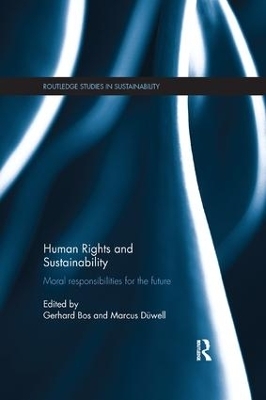
Human Rights and Sustainability
Routledge (Verlag)
978-0-8153-5566-3 (ISBN)
This book develops the idea of environmental obligations as long-term responsibilities in the context of human rights. It proposes that human rights require recognition that, in the face of unsustainable conduct, future human persons are exposed and vulnerable. It explores the obstacles for long-term responsibilities that human rights law provides at the level of international and national law and challenges the question of whether lifestyle restrictions are enforceable in view of liberties and levels of wellbeing typically seen as protected by human rights.
The book will be of interest to postgraduates studying Human Rights, Sustainability, Law and Philosophy.
Gerhard Bos is a postdoctoral researcher at Utrecht University. Marcus Düwell is the Director of the Ethics Institute at Utrecht University.
1. Human Rights and Future People: An Introduction PART I – Obstacles and Promises in Contemporary Human Rights Law 2. Greening Human Rights Law: A Focus on the European Convention on Human Rights 3. An Atmospheric Trust to Protect the Environment for Future Generations? Reform Options for Human Rights Law 4. Avoiding the Tragedy of Human Rights: How Complex Thought May Open the Way to Recognising Human Rights for Future Generations 5. International Human Rights and Duties to Future Generations: The Role of an International Constitution PART II – Long-term Responsibility and the Theory of Human Rights 6. Human Dignity and Intergenerational Human Rights 7. Human Rights and Threats concerning Future People: A Sufficientarian Proposal Jos Philips 8. Human Rights, Climate Change, and Sustainability 9. A Chain of Status: Long-term Responsibility in the Context of Human Rights PART III – Human Rights Approaches to Sustainability 10. Human Rights as a Normative Guideline for Climate Policy 11. The Duties We Have to Future Generations: A Gewirthian Approach 12. Ecological Rights of Future Generations: A Capability Approach PART IV – Implications and Implementation 13. On Current Food Consumption and Future Generations: Is There a Moral Need to Change our Food Consumption in Order to Safeguard the Human Rights of Future Generations? 14. Climate Change and the Right to One Child 15. The Institutional Representation of Future Generations 16. Human Rights, Sustainability and Future People – A Future Discussion
| Erscheinungsdatum | 02.01.2018 |
|---|---|
| Reihe/Serie | Routledge Studies in Sustainability |
| Zusatzinfo | 1 Tables, black and white; 1 Illustrations, black and white |
| Verlagsort | New York |
| Sprache | englisch |
| Maße | 156 x 234 mm |
| Gewicht | 453 g |
| Themenwelt | Naturwissenschaften ► Biologie ► Ökologie / Naturschutz |
| Recht / Steuern ► EU / Internationales Recht | |
| Sozialwissenschaften ► Politik / Verwaltung | |
| Technik ► Umwelttechnik / Biotechnologie | |
| Wirtschaft ► Volkswirtschaftslehre | |
| ISBN-10 | 0-8153-5566-1 / 0815355661 |
| ISBN-13 | 978-0-8153-5566-3 / 9780815355663 |
| Zustand | Neuware |
| Haben Sie eine Frage zum Produkt? |
aus dem Bereich


